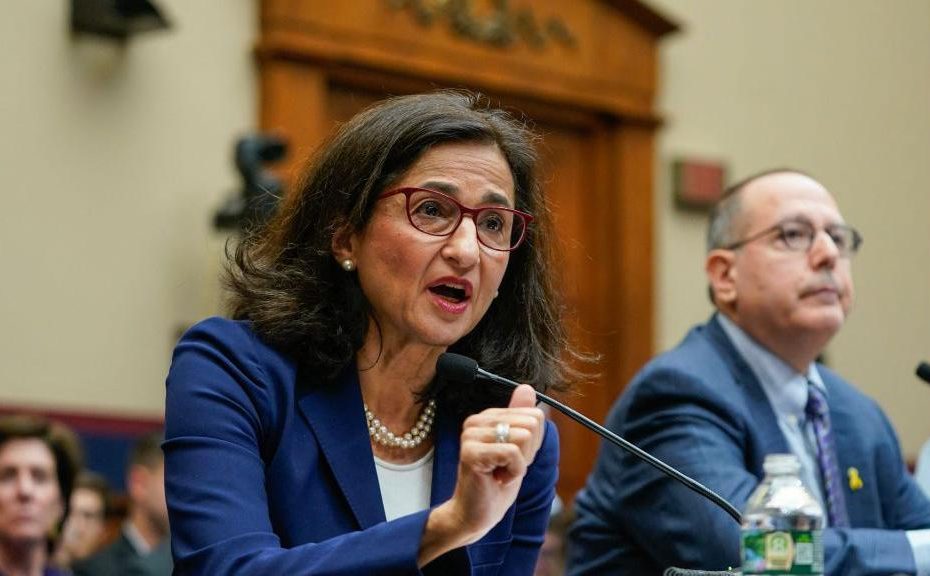Columbia University President Minouche Shafik has resigned amid a debate over free speech over campus protests against the war in Gaza.
Ms. Shafik resigned just a year after taking her job at the private Ivy League university in New York City, and just weeks before the fall semester was to begin.
Ms Shafik is now the third president of an Ivy League university to resign over its handling of protests against the war in Gaza.
In April, Ms. Shafik authorized officers of the New York Police Department to storm campus, a controversial decision that led to the arrest of approximately 100 students who were occupying a university building.
It was the first time mass arrests had been made on Columbia's campus since the Vietnam War protests began more than 50 years ago.
The move sparked protests at dozens of colleges in the United States and Canada.
Ms. Shafik wrote in an email to students and faculty on Wednesday that she had experienced a “period of unrest” where it was difficult to overcome the differing opinions within our community.
“This period has taken a huge toll on my family, as well as others in our community.”
Katrina Armstrong, CEO of Columbia University Irving Medical Center, will serve as interim president.
“Over the summer, I have had the opportunity to reflect and have decided that my departure at this point will best position Columbia to meet the challenges ahead,” Ms. Shafik wrote in her letter.
“I have tried to walk a path that upholds academic principles and treats everyone with fairness and compassion,” she continued.
“It is painful — for the community, for me as president, and on a personal level — to see myself, colleagues, and students targeted with threats and abuse.”
Student anger over Israel's conduct of the war against Hamas has raised questions for university administrators, who are already grappling with heated debates on campus about what is happening in the Middle East.
Since Hamas's October 7 attack on Israel and Israel's subsequent invasion of the Gaza Strip, American college campuses have been a hotbed of protests against the war in Gaza.
Leaders from Harvard University, the University of Pennsylvania (UPenn), and the Massachusetts Institute of Technology all testified before the House Committee on Education and Labor.
The presidents of Harvard and UPenn eventually resigned after widespread criticism of their handling of the campus protests and congressional testimony, including refusing to say that calling for the deaths of Jews might violate university policy.
In April, Ms. Shafik defended her institution’s efforts to address anti-Semitism to Congress, saying there had been an increase in such hatred on campus and that the institution was working to protect students.
Ms Shafik is a highly respected economist of Egyptian descent who previously worked for the World Bank, the International Monetary Fund and the Bank of England.
She was also previously President of the London School of Economics.
Ms Shafik, who was made Dame in 2015, was previously considered for the position of governor of the Bank of England, the BBC reported in 2019.
In her letter, she writes that the British Foreign Secretary has asked her to lead a “review of the government's approach to international development and how capacity can be improved”.
The decision, she wrote, “enables me to return to the House of Lords and re-engage with the important legislative agenda presented by the new UK government”.
Her resignation comes after three deans of Columbia University resigned last week after text messages showed the group used “anti-Semitic language,” according to a statement from Ms Shafik, during a discussion about Jewish students.
The text exchanges were originally released in early July by the Republican-led House Education and Labor Committee.
Congresswoman Virginia Foxx, chair of the congressional committee, praised the three directors' decision to resign.
“It was about time. Actions have consequences,” she said in a statement last Thursday, adding that the decision should have been made “months ago.”
“Instead, the university continues to send mixed signals,” she continued, adding that the administration is allowing a dean who has not resigned “to fly under the radar with no real consequences.”
Universities in the US are preparing for the start of the academic year in the coming weeks as the conflict in Gaza continues.
On Tuesday, a California judge ruled that UCLA, where violent protests broke out on campus in May, must prevent protesters from denying Jewish students access to campus facilities.
Judge Mark Scarsi ruled that the protesters “set up checkpoints and required passersby to wear special wristbands to pass through them,” and that they were blocking “people who supported the existence of the State of Israel.”
“Jewish students were barred from parts of the UCLA campus for refusing to renounce their faith,” Judge Scarsi wrote in the order. “This act is so unimaginable and so horrific to our constitutional guarantee of religious freedom that it bears repeating.”
The university blames outside troublemakers for the checkpoints and says it objects to the ruling.
On October 7, Hamas fighters killed about 1,200 people in an attack on Israel, and 251 others were taken back to Gaza as hostages.
That attack sparked a large-scale Israeli military offensive against Gaza and the current war.
At least 39,897 Palestinians have been killed in the Israeli campaign, according to the Hamas-led Health Ministry in Gaza.
![]()

